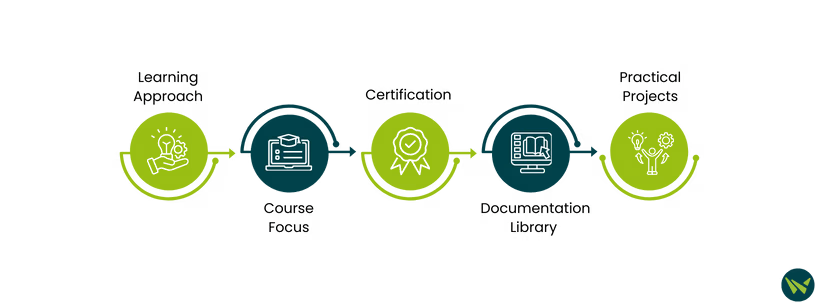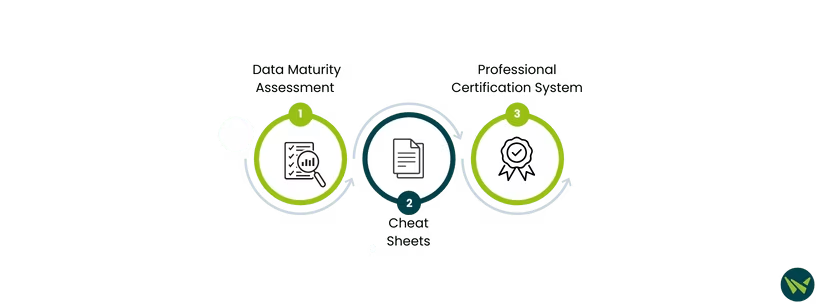
Trying to learn coding but not sure which platform to pick? You are not alone. An ideal learning management system (LMS) does more than just deliver lessons: it helps you practice, apply, and grow. Features like hands-on coding, real-time feedback, and structured learning paths can make all the difference.
DataCamp and Codecademy are two popular choices for learning tech skills. With overlapping strengths in Python, SQL, and career-focused tracks, picking between the two can be challenging.
This DataCamp vs Codecademy guide will break down their core differences and help you decide which one fits your goals best. Let’s take a closer look.

Feature | DataCamp | Codecademy |
Learning Approach | Offers hands-on, interactive learning and tutorials | Live learning bootcamps, instructor-led, expert guidance |
Course Focus | Specializes in data science, analytics, and AI with deep coverage in Python, R, and SQL | Offers a broad tech focus: web development, computer science, data, and DevOps |
Documentation Library (Docs) | A growing, open-access library with curated references | An editable reference hub covering multiple programming languages |
Certifications | Fundamental certifications, career certifications, and technology certifications | Professional certificates after the completion of learning projects |
Practical Projects | Offers over 160 real-world projects | Guided portfolio projects, real-world code challenges |
Pricing | Offers a free plan, and the priced plans start from $29/month | Offers various pricing structures, starting from $14.99/month |
Disclaimer: The pricing is subject to change.
DataCamp is an online learning platform that makes it easier for individuals and teams to build technical expertise in data and artificial intelligence (AI). It promotes broad access to data literacy and AI skills by making advanced topics approachable and practical for all users. Learners can dive into Python, ChatGPT, Power BI, and other in-demand tools through interactive lessons and real-world projects.
Focused on career advancement, DataCamp also offers progressive certification tracks that are built over time. Whether you're upskilling solo or training a company-wide team, the platform adapts to different learning goals. It supports growth on personal, professional, and organizational levels: empowering better decisions through data.
Unique Features Of DataCamp

- Data Maturity Assessment: A 10-minute, 26-question tool that helps teams measure how well they use data across the organization, ideal for identifying gaps and guiding data-driven growth.
- Cheat Sheets: Provides easy-to-use reference guides on advanced topics like NLP in Python, the Bokeh library, and data.table in R, ideal for quick concept reviews during work.
- Professional Certification System: Offers foundational, career-focused, and technology-specific certifications, each designed in progressive stages to match the learner’s skill level, pace, and long-term objectives.
Pros And Cons Of DataCamp
Pros
- The platform has a clean and well-structured interface that is simple to navigate
- Designed to support learners at all levels, from beginners to advanced users
- Users can preview content by exploring the first chapter of any course without needing to sign up
Cons
- Certificates lack accreditation, limiting their value in professional contexts
- Courses are often repetitive and overly guided, leaving little room for challenge or growth
Codecademy is an online learning platform that helps individuals build coding and technical skills. It comes with a built-in course library and structured learning paths. The library is extensive, offering options based on skill level, pricing plans, and career goals.
Whether you're interested in web development or data science, a wide range of topics is available on a single platform. The learning experience is simplified through interactive lessons and real-time feedback. Codecademy is ideal for beginners and professionals looking to upskill across various industries, including tech, finance, and education.
Unique Feature Of Codecademy

- Live Virtual Bootcamps: Offers instructor-led online sessions with real-world projects, feedback, and a free year of Pro access; it is ideal for hands-on learning and career advancement.
- Guided Portfolio Projects: Allows learners to apply new skills by building interactive, job-relevant projects with expert guidance: perfect for gaining experience and strengthening portfolio.
- Real-World Code Challenges: Sharpen your skills with coding tasks inspired by actual interviews at top tech companies: great for job prep, with helpful course suggestions in case you get stuck.
Pros And Cons Of Codecademy
Pros
- Offers 12 in-demand programming languages, including Java and Python, allowing learners to study at their own pace
- User-friendly and straightforward platform design makes it easy to access and use all key features
- Content is high-quality and meets current industry standards, making learning relevant and effective
Cons
- Repeated YouTube ads before development videos can disrupt the learning experience
- Course instructions can be confusing, limiting engagement and learning outcomes

DataCamp offers three pricing tiers: Free, Premium at $29/month, and Team at $28/user/month (billed annually). The Free plan includes limited content access, while the Premium plan unlocks full individual access. The Team plan adds admin tools like user management and analytics for organizations.
Similarly, Codecademy provides pricing options for individuals, students, and businesses. Individual plans include a Basic (free) tier, Plus at $14.99/month, and Pro at $19.99/month, both with free trials. For businesses, the Teams plan costs $299/user/year with a 14-day trial, while Pro and Enterprise tiers offer custom pricing based on business requirements.
Disclaimer: The pricing is subject to change.
DataCamp caters more specifically to individuals and teams focused on data-driven careers in fields like analytics, finance, healthcare, and consulting. With its clear emphasis on data science, AI, and practical certifications, it is ideal for organizations seeking scalable training and individuals aiming to validate job-ready skills with real-world tools.
Codecademy, on the other hand, is well-suited for learners exploring a wide range of tech skills beyond data, including web development, computer science, cybersecurity, and DevOps. It’s a strong fit for students, early-career professionals, and even coding bootcamp alternatives looking for structured paths and hands-on projects. Its interactive learning environment makes it particularly valuable in fast-evolving tech roles and startup settings.
In the end, your choice depends on what you’re trying to achieve. If you need tailored advice to match your learning or team goals, contact us for a personalized recommendation.
